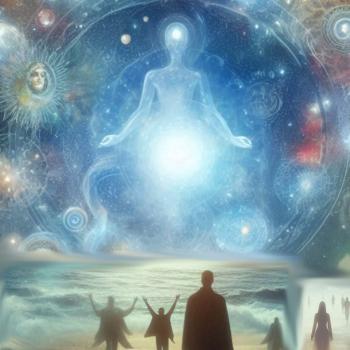The Big Questions series
Worldwide, people hate change. They resist it tooth and nail. But in the end they adapt. Or they don’t and it’s very disruptive to them and the world around them. How do we adapt to change when the world around us is constantly changing? It’s really difficult and many of the problems we’re seeing today come from resistance to change. It causes extremist views. It causes people to declare facts invalid in their lives.
Change creates extreme doubt of government, political parties, religion, and the general social fabric of our lives on both sides. It’s tearing our nation apart. And many people capitalize on these things for their own advantage, stirring up trouble.

At the North Pole, all directions are South and they all end up at the South Pole. Yet they take widely divergent paths. How do you accept that one direction can be a major change from another?
People universally resist change
It can be very comfortable to resist change, to declare those behind it the enemy, and live in chaos or resistance rather than adapt and live a full life. In the book Change or Die, Alan Deutschman found that only 9% of people are willing to make lifestyle choices that would prolong life and improve health.
As a recent heart bypass patient, I understand how difficult it is to change lifestyle. But I work at making lifestyle choices that prolong life, despite others’ protests 🙂 . Sorry, I refuse to go away. I knew a person who was told to stop smoking or he would only get a 10-year life extension from bypass surgery. He said cigarettes were his friend and he died 10 years later at 68. His brother with the same condition made lifestyle choices and lived to age 92, which is six years beyond the 86-year mathematical mode for most people.
The average US lifespan is currently decreasing due to obesity and more than half the world will be overweight or have obesity by 2035.
Why do we resist change?
I did a psychology lab in college regarding doing a simple exercise to preserve heart health. The result was unanimous refusal to make a simple lifestyle change. I began to understand that knowledge doesn’t motivate people to make changes no matter how solid the knowledge is.
This realization sent me into studying attitude change which is something I’ve studied and worked with for decades. As someone who has constantly been involved in driving change in churches-religion-spirituality, business, communities, and technology, today I almost wish I didn’t know what I know about people and change. Nine percent is depressing. People uniformly won’t change except for those 9%, but I have to move forward. It’s mainly young people who will accept change and even drive it.
The older we get the more set we get in our beliefs and attitudes and challenging them challenges who we are as a person, our identity.
Identity and World view
Our identity is a paradigm composed of many things including cultural views, religion, political views, friend and family views, peer views, etc. This view is how we interpret the events in the world around us. If change brings challenges to any of these, our world falls apart. Essentially this is because our views aren’t well founded, they are simply inherited so they are easily challenged. Or even if they are well founded and robustly challenged we lose our ability to understand, predict, and control the world around us.
Stop the World, I Want to Get Off. It’s a Mad, Mad, Mad World. Okay, those are two movie titles from the 1960s. But the titles capture today’s world and attitudes.
Since 1900 the pace of change in the US and most of the world has been accelerating. The world is nothing but change. It’s one revolution after another. It’s dizzying. What do we hold onto? It brings anxiety and fear and there is no practical way to stop it.
Some try to stop it anyway. They resist change. They go to extremes to back up their views. They turn to threats and violence. Some demand absolutes. Some believe incorrect facts and through this some go into a type of insanity. Some experience debilitating anxiety. Some become paranoid and see all who don’t believe as they believe as a threat. Some experience trauma.
The harder people push to make others accept change, the harder people resist. Change, like all things, is least successful when forced on people. It has to be something they want – they have to “buy into it” so they own it. Yet some change is necessary.
There are techniques that help people accept what they see as in their best interests. Since you can’t make people change you have to lead them, and that first starts with being nonthreatening and doing a lot of listening. One of my experiences with change: Reflections on Business: Building Effective Organizations that formed the basis of how I worked with other change.
If 80 Percent Of People Won’t Change, Why Force Them?
Summary of Psychological Entropy: Your stability depends on how much uncertainty you can tolerate
I encourage you to read the article, Psychology of Entropy. It resonates with my experience.
I summarize it here:
The only certainty in life is change. But we need certainty and predictability in our lives. Endless chaos is too difficult to live with. If we reject change we develop defense mechanisms to help us feel safe from adversity. With nothing to cling to everything seems believable so we grab for what is convenient to us.
In this state of chaos we may develop disorders such as anxiety, depression, or even psychosis.
Endless resistance takes considerable time and energy. (I often tell people I don’t have time to hate others or argue endlessly with them because it is extremely consuming.)
We have to tolerate uncertainty, while developing perceptions of the world predictable enough to allow us to continue with our lives.
Change challenges us and changes us in positive ways. This is even more solid in our lives than our previous attitude.
We need something stable [solid core beliefs] and important goals in our life. Then the ground can shift but we’re still stable.
Accepting change makes us more serene [not less].
We need stability
As the ground shifts and is pulled out from underneath us we need something to hold onto on this merry-go-round of life that goes faster and faster. All beliefs that are well grounded shatter and leave us paralyzed in disorientation and fear. Which way do we turn? How do we live?
Jesus and truth
The rate of change in our society is dizzying. But there are ways to cope with it. For example, figure skaters who spin don’t get dizzy for two reasons. First, they keep their eye on a target in the background. We all need something to ground us or center us – call it what you will.
Second, is called Optokinetic Nystagmus. “They’ve conditioned their bodies and brains to suppress the feeling of dizziness by controlling their vestibular system, which is responsible for body balance, coordination, and control.”
Both of these techniques can work for us. Using the second technique we can accustom ourselves to change. Change is a constant in everyone’s life and it’s all consuming to fight against it. We have to learn to tolerate uncertainty and realize that this is a mechanism of growth and it generally leads toward greater certainty.
Using the first technique we fix our eye on something that is stable. For me, and I suggest for you, that stable thing is God. We know that what God presented to us through Jesus is love. Love fulfills the law. We know it’s true that when we treat people with kindness and love as God has shown us, our relationships are better and our lives are better.
Jesus: the path to serenity
When we are accepting or acting in accordance with the way God has shown us to live, we make very few mistakes in what we believe and how we conduct our lives. This truth is the path to serenity.
Jesus brought radical change to the world of Judaism, then sent his apostles to bring the Good News of forgiveness and all that implies to the rest of the world.
“So Jesus was saying to those Jews who had believed Him, “If you continue in My word, then you are truly disciples of Mine; and you will know the truth, and the truth will make you free.” – John 8:31-32 (NASB)
Jesus said, “Peace I leave with you; My peace I give to you; not as the world gives do I give to you. Do not let your heart be troubled, nor let it be fearful.” – John 14:27 (NASB)
________________________
The standard of belief and conduct for Christianity is love. God is love. We’re asked to be like God.
________________________
If you find these articles intriguing, please consider joining the mailing list.
If I’ve challenged your thinking, I’ve done my job.
___________________
Our answer is God. God’s answer is us. Together we make the world better.
– Dorian












